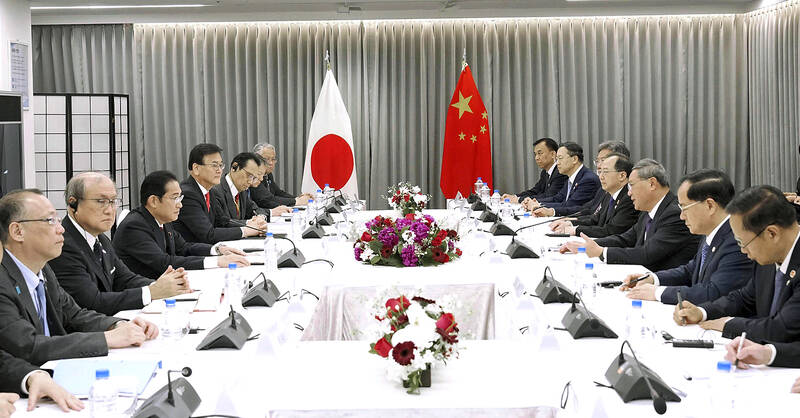Japanese Prime Minister Fumio Kishida reiterated the importance of stability across the Taiwan Strait while Chinese Premier Li Qiang (李強) said Taiwan issues are “a red line” for China.
Kishida and Li traveled to Seoul for the first China-Japan-South Korea trilateral summit since 2019, which was held yesterday.
Before the three leaders met, Kishida, Li and South Korean President Yoon Suk-yeol held bilateral meetings on Sunday.

Photo: Kyodo News via AP
During the meeting with Li, Kishida “reiterated that peace and stability in the Taiwan Strait is extremely important to the international community, including Japan,” the Japanese Ministry of Foreign Affairs said.
Japan is closely monitoring developments across the Taiwan Strait, including “the recent military situation,” it said.
Kishida was referring to the “Joint Sword-2024A” military exercise Beijing launched around Taiwan on Thursday and Friday last week, Sankei Shimbun cited a source traveling together with the prime minister as saying.
Kishida also expressed “serious concerns” about China’s increased military activities around Japan, including the Senkaku Islands, called the Diaoyutai Islands (釣魚台) in Taiwan and China, and the East China Sea, while asking for the immediate removal of buoys that China set up within Japan’s exclusive economic zone, the ministry said.
Li said that issues regarding Taiwan and history are “matters of principle related to China’s core interests and also matters of faith,” Kyodo News reported on Sunday.
“In particular, the Taiwan issue is the core of China’s core interests and is a red line,” Li said, which Kyodo News said was an attempt to “keep Japan in check.”
Chinese President Xi Jinping (習近平) and Kishida reached an important agreement to promote a “mutually beneficial relationship based on common strategic interests” when they met in San Francisco in November last year.
“It is hoped that Japan would keep its promise and create a positive atmosphere for the continuous development of bilateral relations,” China News Service cited Li as saying.
Kishida said that Japan’s position regarding Taiwan as stated in the Japan-China Joint Communique of 1972 has not changed, it reported.
The document states that Japan would sever diplomatic relations with Taiwan, with which it would deepen non-governmental practical cooperation mainly in the economic field, Kyodo News said.
After the trilateral meeting yesterday, the three leaders said they agreed to strengthen cooperation with ASEAN countries and countries in the Middle East as a response to international issues such as the threats posed by North Korea and Russia’s invasion of Ukraine.
The issue about the Taiwan Strait was not mentioned in the joint statement issued after the meeting.
Additional reporting by CNA

A strong continental cold air mass is to bring pollutants to Taiwan from tomorrow, the Ministry of Environment said today, as it issued an “orange” air quality alert for most of the country. All of Taiwan except for Hualien and Taitung counties is to be under an “orange” air quality alert tomorrow, indicating air quality that is unhealthy for sensitive groups. In China, areas from Shandong to Shanghai have been enveloped in haze since Saturday, the ministry said in a news release. Yesterday, hourly concentrations of PM2.5 in these areas ranged from 65 to 160 micrograms per cubic meter (mg/m³), and pollutants were

Taiwan’s armed forces have established response protocols for a wide range of sudden contingencies, including the “Wan Chun Plan” to protect the head of state, the Ministry of Defense (MND) said today. After US President Donald Trump on Saturday launched a series of airstrikes in Venezuela and kidnapped Venezuelan President Nicolas Maduro, concerns have been raised as to whether China would launch a similar “decapitation strike” on Taiwan. The armed forces regularly coordinate with relevant agencies and practice drills to ensure preparedness for a wide range of scenarios, Vice Minister of National Defense Hsu Szu-chien (徐斯儉) told reporters before a

EVA Airways on Saturday said that it had suspended a pilot and opened an investigation after he allegedly lost his temper and punched the first officer several times as their plane was taxiing before takeoff at Los Angeles International Airport. According to a report published on Thursday by The Reporter, the incident occurred after the flight’s Malaysian first officer tried to warn the Taiwanese pilot, surnamed Wen (文), that he was taxiing faster than the speed limit of 30 knots (55.6kph). After alerting the pilot several times without response, the first officer manually applied the brakes in accordance with standard operating

NOT AN OPENING: Trump’s violation of international law does not affect China’s consideration in attacking Taiwan; Beijing lacks capability, not precedent, an official said Taiwanese officials see the US’ capture of the president of Venezuela as a powerful deterrent to Beijing’s aggression and a timely reminder of the US’ ability to defeat militaries equipped with Chinese-made weapons. The strikes that toppled Venezuelan President Nicolas Maduro signaled to authoritarian leaders, including Chinese President Xi Jinping (習近平), US President Donald Trump’s willingness to use military might for international affairs core to US interests, one senior official in Taipei’s security circle said. That reassured Taiwan, the person said. Taipei has also dismissed the idea that Trump’s apparent violation of international law could embolden Beijing, said the official, who was not